Gov. Phil Murphy, George Norcross Battle Like Goodfellas and On the Waterfront
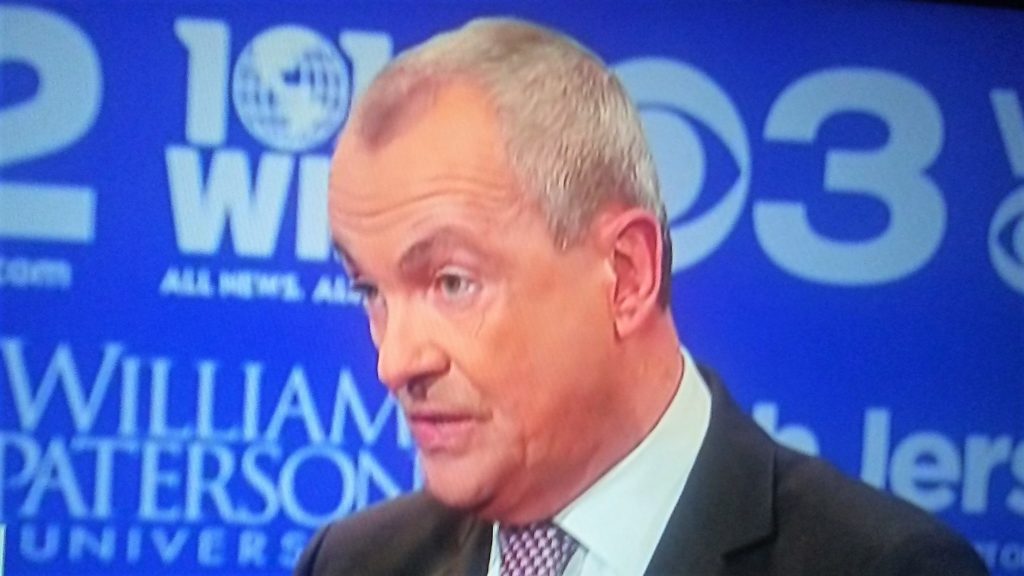

The statehouse is really just a big riverside warehouse.
Or a big diner, where bad things happen.
Either way, right now represents an extraordinary moment in the political history of New Jersey, a state that struggles with the two sides of its personality, like an ongoing, simultaneous screening of Goodfellas and On the Waterfront.
At first glance, with all the overlapping dock front swamp arts on display, the movies look alike.
But one is actually a process story about gangsters behaving badly - to put it mildly - and getting away with it (with some yuks along the way) wherein a confession on the witness stand is at best a moment of moral ambiguity; while the other celebrates a protagonist from within a corrupt organization who - beset by conscience - finally does the right thing, takes a beating for it, a vicious and bloody beating, but prevails - complete with Leonard Bernstein score.
As establishment players in state politics treat every day like a new opportunity to pull of the Lufthansa heist and ridicule those in their midst whose wigs don't come off, Gov. Phil Murphy's allies hope their guy ultimately proves to possess qualities of a governmentally slow-witted but at last dashing plug ugly, like Terry Malloy in Waterfront, who leads the legislature into another work station and leaves a drenched and humiliated Norcross - played by Lee J. Cobb - vainly screaming for his toadies to get back to work.
That's the ending they're looking for here.
That's the narrative they want.
It's a tough lift.
South Jersey Power Broker George Norcross III has his hooks in the legislature. People who look like thoughtful, discerning and independent-minded libs are actually, through a network of relationships fastened to South Jersey and its power center, on the payroll.
Without influence over those votes, Murphy, in the words of one insider observing the budget debacle, is "just a progressive at a podium." Worse, by the reckoning of another statehouse veteran, he's "Governor [Vinny] Prieto," a dig at the former speaker who tried to buck Norcross and invariably came up short of the votes required to buck the boss' agenda.
Yesterday, though, Murphy - out-hoisted on the backroom political front, relegated in one retelling to the part of the club owner bullied by Joe Pesci, offered the argument he's down to on the 2020 $38 billion budget: a moral argument.

Cue the Trenton laugh track.
There's no moral center to Goodfellas.
Only moves made, bodies piled, and ensuing laughs.
But Murphy - in his version of events - was indeed playing Malloy in Waterfront, appropriately accompanied by waterfront labor leader Ray Greaves of Bayonne and other allies - none of whom, incidentally, control any of the legislators the way Norcross does.
Murphy offered his argument within a stew of cynical fiddle-playing on the other side of this "debate."
For months, the Democratic Party establishment made the case to the public about an incompetent administration. They built some traction out of it, too, enough to get a story line going. They used as prime exhibits Team Murphy's hiring of Al Alvarez at the state Schools Development Authority (SDA) even after the inner circle knew about an allegation of sexual harassment made against him.
Republicans didn't have to jump on board.
They were already there, by virtue of Murphy's 2017 campaign promise to raise taxes.
But the alleged incompetence angle hastened their case.
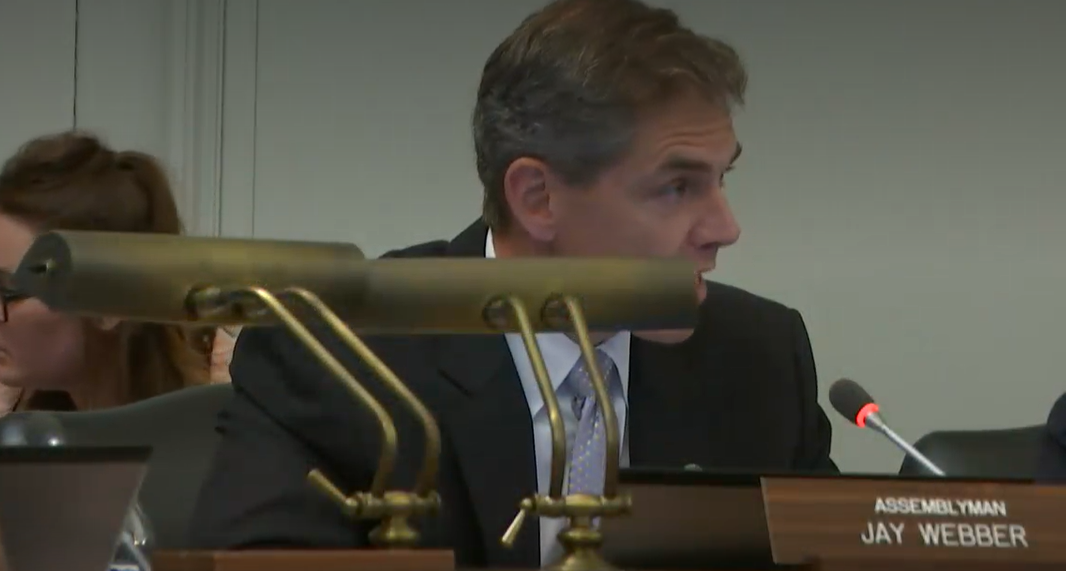
"He certainly didn't have Katie Brennan's back," announced Assemblyman Jay Webber (R-26) in appropriations committee yesterday afternoon, referencing Murphy's campaign trail commitment to having - as a general matter - people's backs.
Then Murphy weathered the state Schools Development Authority (SDA) scandal.
Webber heaped outrage on outrage.
"Not only are they shielding an alleged rapist," seethed the Morris County Republican.
But in spawning what he identified as "one of the worst patronage stories" ever - no easy feat in New Jersey - the administration enabled an agency that betrayed the taxpayers, and betrayed the children. It was supposed to be building schools. The former director turned it into a patronage pit."
Webber had spent years in the legislature reliably surgically dismantling Democrats, but now he spoke with the urgency of one who's felt firsthand and at close range the blowtorches of the uncontrolled reaches of the Democratic Party, which last year charred his chances of landing the congressional seat in the 11th District.
Webber would rather have an icy professional relationship with Appropriations Chairman Assemblyman John Burzichelli (D-3) than have to endure the redoubled lanterns and pitchforks that ensued when he did a fundraiser with President Donald J. Trump - otherwise known as a critical part of Murphy's progressive base.
Of course, the Republican assemblyman suffered not only last year's loss but damage to the nimbus of his own imposing moral authority when he welcomed Trump, when his general election opponents, in fact, suctioned him to Trump.
Still, back in Trenton, the veteran movement conservative knew his essential perspective would connect to a constituency worn out with cronyism in his home state. Webber knows that in New Jersey, amid corrosive private empires on the public dime, the case for more taxes amounts to moral turpitude.
Democrats in would-be swing districts know that, too. Without the NJ-reviled Trump in power to galvanize New Jersey voters against the GOP, they know if they overreach on taxes, they could experience a reliving of Jim Florio's worst nightmare.
Even Democrats in relatively safe districts, even without the benefit of Trump or bogeyman visions of former Governor Chris Christie, know the score. The statewide context does not allow New Jersey politicians to commit to raising taxes without a strong accompanying anti-corruption, "I'm going to save you money by eliminating waste" argument.
In purely mechanical terms, it is assuredly too late to accomplish without driving the state past the June 30th deadline into a shutdown.
But yesterday, Murphy renewed his call for an expanded millionaire's tax while armed with the preliminary findings of a task force he founded to examine the alleged improper administration of tax incentives that benefited businesses run by South Jersey Democratic Party Power Broker George Norcross III. The task force has already produced a criminal referral, and the boss' attorneys this week acknowledged contact by the Attorney General's Office. This from ROI-NJ: "We will be asking the legislative committees reviewing the state’s incentive programs to allow us to participate in their hearings and will fully cooperate in their review just as we are already cooperating with the state Attorney General’s Office in its inquiry."
This context - wholly by design, of course - enabled Murphy to make his most compelling and potent
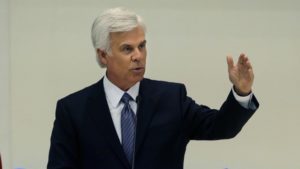
argument to date. The millionaire's tax as a way to give $125 back to each New Jersey taxpayer amounts to Jon Corzine-like gimmickry. But the millionaire's tax as an argument for exacting payment from that part of the population enjoying the benefits of Trump tax cuts, while demonstrating an all-in effort to change the course of the state - that bore a tinge of Terry Malloy-like morality.
“No one is above the law,” said Murphy, reacting to the report, which contains details about false EDA application preparation by an ally of Norcross working at Cooper Hospital, and vowing to continue to try to account for what he said was $11 billion in EDA tax breaks.
“We are not dealing with a broken system,” the governor told reporters. “This is a rigged system. This was designed by special interests for special interests.” He denounced the flowing of hundreds of millions of dollars to insiders.
“This system cannot be allowed to continue for one day past June 30th,” Murphy said. “Let me be perfectly clear. If the legislature sent me renewal [of the EDA tax program, scheduled for a vote on Thursday] without necessary reforms, it will be vetoed."
Then he doubled down on his quest for a millionaire's tax.
The implication was clear.
At personal and political discomfort to himself, Murphy was exposing allegations of fraud and abuse in
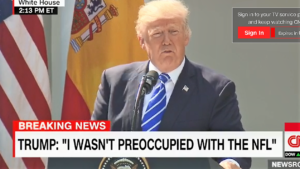
government and using the power of his office to disrupt what he identified as a key offender: the biggest boss left in party organization politics and a member of his own party. He did this - in true traitor to his class fashion - while drawing a link to the benefits millionaire's receive under the federal tax plan of Trump, whose exclusive golf club, incidentally, admits Norcross as a member.
Maybe one muddied the other. If he made the fraud argument without the millionaire's tax, he might get the attention of moderate Republicans.
But it was too late for that, and anyway, he played consistently to a base of voters - unyoked to the power structures of the statehouse - that believed in expanding the tax.
It was a moment.
Will it be enough to break the logjam of the budget?
No.
Put in power by the very machines he's trying to overthrow at crunch time, the governor lacks long-term dock-front traction.
The retired Goldman Sachs dude is an unlikely - even hopelessly miscast - Terry Malloy.
This, in the words of one statehouse source: "One of the reasons no one takes Murphy seriously is that he doesn't even issue specific threats when he's threatening. The closest thing he gets to is 'I will be forced to take corrective action.' That corporate jargon nonsense will affect precisely zero legislators."
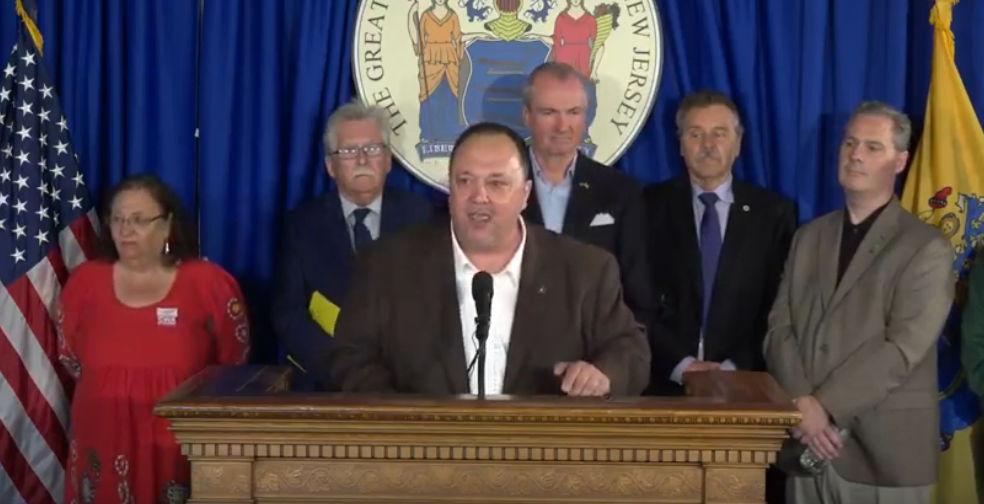
He has allies.
But they also don't control votes.
Born in Jersey City and a member of organized labor his whole life, Amalgamated Transit Union Business Agent and Chair Greaves from Bayonne in his appearance with the governor yesterday afternoon chastised the Democratically-controlled legislature.
Christie alone didn't pass five budgets that underfunded NJ Transit.
"There was a legislature," Greaves reminded reporters. "The same legislature that's there now."
Ever fearful of a Johnny Friendly-like threat that they'll never push another wheelbarrow of dreck in this state again, the legislature doesn't want Murphy's millionaire's tax.
"I've talked to lawmakers and no one's committing to expanding the tax," Greaves told InsiderNJ.
It was too much.
The caucus wouldn't buck Speaker Craig Coughlin (D-19), installed in the chair of power to ensure the maintenance of the Norcross superstructure.
Coughlin and his allies, moreover, had their own benefit of context, and instinctive understanding of knowing the hazards of overreaching on taxing New Jerseyans. In the words of Democratic Assembly Campaign Committee (DACC) Chief Mike Muller as he assessed, one year, the 14th District: behind every door is a public sector worker or an angry taxpayer.
Sometimes both.
Legislative leadership and the reinforcing structures around them know that in order to sustain their own patronage, their own fun and games, they have to appear sternly taxpayer-friendly.
A millionaire's tax could rouse the bears from the dens.
They also took pains to note how the 2019 budget will finish the year with a nearly $1.5 billion surplus, not a $104 million deficit as predicted by the governor.
Shenanigans at the EDA?
They're gambling that it's too complicated to rile the average person out there.
But by advocating the tax while going after their patronage and their boards and authorities, by getting a judge this week to see that his oversight into the maintenance of those boards doesn't constitute abuse of gubernatorial power, but on the contrary, the wise use of power, and trusting in his ability ultimately to reach those same allies who overthrew Webber, the governor walked on State Street amid Goodfellas din, up the gangplank, Greaves in the Karl Malden role, watching the unsteady Terry Malloy governor, stumbling, beat up, as he tried to lead the legislature into another version of the statehouse warehouse not controlled by Norcross.
They wouldn't follow.
It wouldn't be the ending Murphy wanted.
But this wasn't an ending; it was a long walk, one not wholly conditioned by this budget cycle, with subpoenas kicking around, and Murphy, ridiculed, wasn't following a Goodfellas script.






